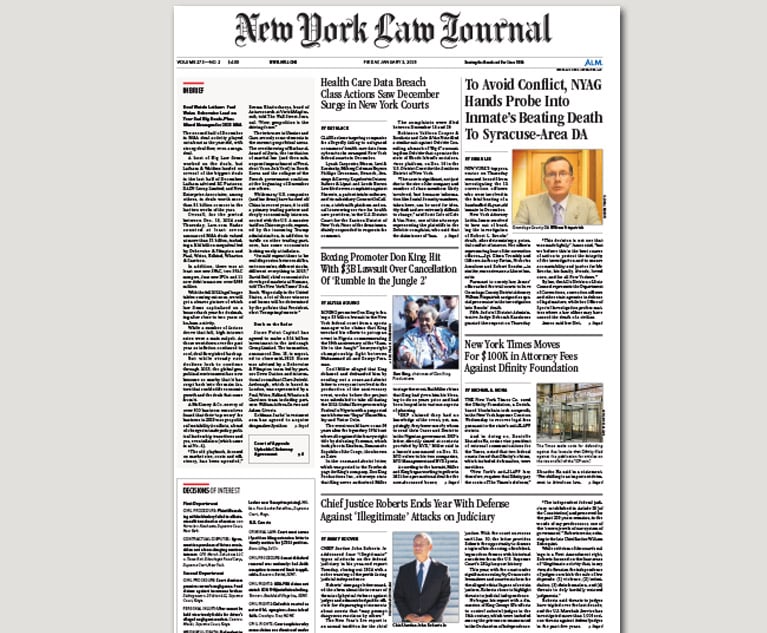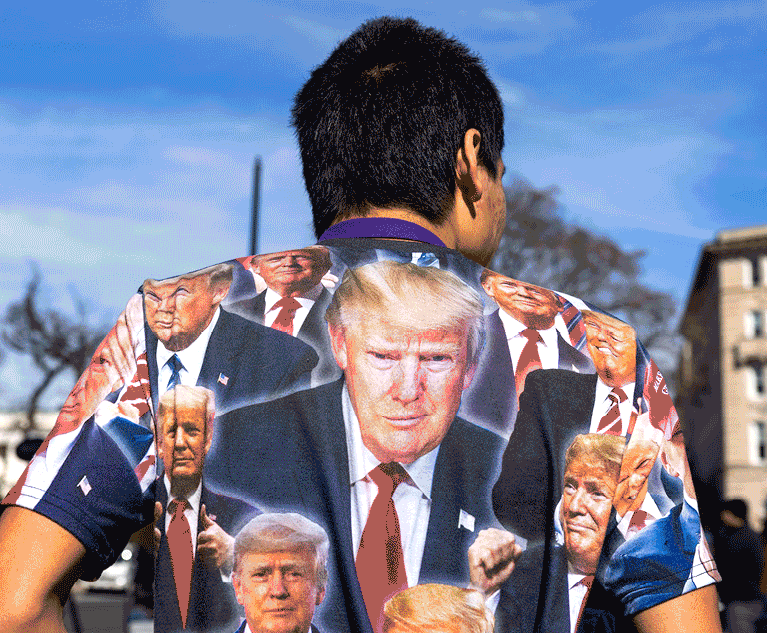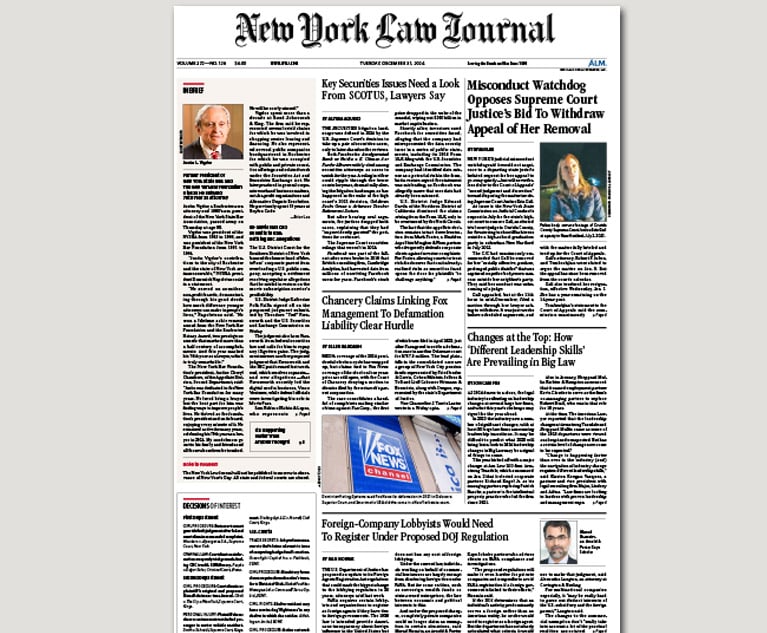 Manhattan Supreme Court at 60 Centre Street
Manhattan Supreme Court at 60 Centre StreetClient-Poaching Suit Between Personal Injury Firms Survives Dismissal
Several key claims from the Ginarte firm's client-poaching lawsuit against William Schwitzer were given the green light for discovery, but two claims that could have offered triple damages were cut.
November 05, 2019 at 02:14 PM
4 minute read
A suit filed by personal injury firm Ginarte Gallardo Gonzalez & Winograd against competitor William Schwitzer for allegedly paying "runners" to stake out a doctor's office and bribe clients into switching firms was allowed to partially proceed to discovery.
Manhattan Supreme Court Justice James D'Auguste, ruling on a motion to dismiss, said Monday that the Ginarte firm's claims for tortious interference, defamation and civil conspiracy can advance against the Schwitzer firm and its co-defendants. However, other claims—for attorney deceit, unfair competition and racketeering, among other things—were cut from the case, as was the Schwitzer firm's counterclaim for defamation.
Ginarte, represented by Clifford Robert of Robert & Robert, accuses Schwitzer and its attorneys of working with Rene Garcia, a solo practitioner with whom it shares office space, and two "runners" named Mignolia Pena and Janilda Gomez. Ginarte claims the defendants offered injury victims $2,000 or $3,000 if they would dump Ginarte and hire Schwitzer. It supported its case with an affidavit from one of its paralegals, who went undercover as a supposed injury victim and said he was escorted to the Schwitzer firm's office by the runners for a consultation.
The Schwitzer defendants, represented by Randy Mastro of Gibson, Dunn & Crutcher, have staunchly denied any wrongdoing. The firm has said any clients who switched were firmly within their rights to do business with a lawyer of their choosing, and it denied conspiring with runners to get cases.
In his order Monday, d'Auguste said some of the alleged wrongdoing wasn't actionable under law. For example, he said, New York Judiciary Law Section 487, which bars attorney deceit, only covers parties to judicial proceedings, not the extrajudicial contest for clients described by the Ginarte firm. The judge also cut allegations of defamation that were too vague from the suit.
The judge also cut a claim that accused Schwitzer and its codefendants of violating the Racketeer Influenced and Corrupt Organizations Act. If it or the Section 487 claim had cleared the dismissal stage, triple damages would have been on the table, but d'Auguste said the allegations of criminal acts in support of the RICO claim were too thin.
But the judge repeatedly cited an affidavit of Juan Flores Hernandez, the Ginarte paralegal who pretended to be an injury victim, in his reasoning. In particular, the judge cited Hernandez's description of how he was taken to the Schwitzer firm's offices, and the transcripts of phone calls he had with the "runners."
"Here, the submissions suggest that the Schwitzer defendants improperly used case runners to solicit plaintiff's clients by offering them cash, transportation and loan forgiveness to induce plaintiff's clients to change firms," the judge wrote. "Although [the runners] deny any association with the Schwitzer firm, Hernandez's affidavit indicates otherwise."
The decision came after oral arguments were held in October. In an exchange of letters, the parties indicated that d'Auguste had asked them to consider settlement before he issued a ruling, but the Ginarte firm said a settlement wasn't in the cards.
Both sides found something to like about Monday's ruling. Robert said Joseph Ginarte, a name partner at Ginarte Gallardo, was "very pleased" with the decision.
"The defendant's predictable motions to dismiss did little more than temporarily delay justice for Mr. Ginarte," Robert said in a statement.
Meanwhile, Mastro wrote in an email, "We're gratified that the court has now dismissed most of the Ginarte firm's case, but none of its claims should have survived dismissal." He added: "This baseless litigation is nothing more than a rival's attempt to smear the Schwitzer firm and sully its reputation as one of the premier personal injury law firms in this state. And it will ultimately be dismissed in its entirety."
Neither side would comment about the prospect of mounting an appeal.
This content has been archived. It is available through our partners, LexisNexis® and Bloomberg Law.
To view this content, please continue to their sites.
Not a Lexis Subscriber?
Subscribe Now
Not a Bloomberg Law Subscriber?
Subscribe Now
NOT FOR REPRINT
© 2025 ALM Global, LLC, All Rights Reserved. Request academic re-use from www.copyright.com. All other uses, submit a request to [email protected]. For more information visit Asset & Logo Licensing.
You Might Like
View All
Elizabeth Cooper of Simpson Thacher on Building Teams in a 'Relationship Business'
4 minute readTrending Stories
- 1Class Certification, Cash-Sweep Cases Among Securities Litigation Trends to Watch in 2025
- 2Buchanan Ingersoll Launches in Chicago With 17-Lawyer Team From Locke Lord
- 3$2M Settlement for Woman Struck by New Jersey Transit Bus
- 4BREAKING: Donald Trump to Face Sentencing on January 10, Judge Rules
- 5Samuel M. Lehrer, Retired Philadelphia Court of Common Pleas Judge, Dies
Who Got The Work
Michael G. Bongiorno, Andrew Scott Dulberg and Elizabeth E. Driscoll from Wilmer Cutler Pickering Hale and Dorr have stepped in to represent Symbotic Inc., an A.I.-enabled technology platform that focuses on increasing supply chain efficiency, and other defendants in a pending shareholder derivative lawsuit. The case, filed Oct. 2 in Massachusetts District Court by the Brown Law Firm on behalf of Stephen Austen, accuses certain officers and directors of misleading investors in regard to Symbotic's potential for margin growth by failing to disclose that the company was not equipped to timely deploy its systems or manage expenses through project delays. The case, assigned to U.S. District Judge Nathaniel M. Gorton, is 1:24-cv-12522, Austen v. Cohen et al.
Who Got The Work
Edmund Polubinski and Marie Killmond of Davis Polk & Wardwell have entered appearances for data platform software development company MongoDB and other defendants in a pending shareholder derivative lawsuit. The action, filed Oct. 7 in New York Southern District Court by the Brown Law Firm, accuses the company's directors and/or officers of falsely expressing confidence in the company’s restructuring of its sales incentive plan and downplaying the severity of decreases in its upfront commitments. The case is 1:24-cv-07594, Roy v. Ittycheria et al.
Who Got The Work
Amy O. Bruchs and Kurt F. Ellison of Michael Best & Friedrich have entered appearances for Epic Systems Corp. in a pending employment discrimination lawsuit. The suit was filed Sept. 7 in Wisconsin Western District Court by Levine Eisberner LLC and Siri & Glimstad on behalf of a project manager who claims that he was wrongfully terminated after applying for a religious exemption to the defendant's COVID-19 vaccine mandate. The case, assigned to U.S. Magistrate Judge Anita Marie Boor, is 3:24-cv-00630, Secker, Nathan v. Epic Systems Corporation.
Who Got The Work
David X. Sullivan, Thomas J. Finn and Gregory A. Hall from McCarter & English have entered appearances for Sunrun Installation Services in a pending civil rights lawsuit. The complaint was filed Sept. 4 in Connecticut District Court by attorney Robert M. Berke on behalf of former employee George Edward Steins, who was arrested and charged with employing an unregistered home improvement salesperson. The complaint alleges that had Sunrun informed the Connecticut Department of Consumer Protection that the plaintiff's employment had ended in 2017 and that he no longer held Sunrun's home improvement contractor license, he would not have been hit with charges, which were dismissed in May 2024. The case, assigned to U.S. District Judge Jeffrey A. Meyer, is 3:24-cv-01423, Steins v. Sunrun, Inc. et al.
Who Got The Work
Greenberg Traurig shareholder Joshua L. Raskin has entered an appearance for boohoo.com UK Ltd. in a pending patent infringement lawsuit. The suit, filed Sept. 3 in Texas Eastern District Court by Rozier Hardt McDonough on behalf of Alto Dynamics, asserts five patents related to an online shopping platform. The case, assigned to U.S. District Judge Rodney Gilstrap, is 2:24-cv-00719, Alto Dynamics, LLC v. boohoo.com UK Limited.
Featured Firms
Law Offices of Gary Martin Hays & Associates, P.C.
(470) 294-1674
Law Offices of Mark E. Salomone
(857) 444-6468
Smith & Hassler
(713) 739-1250









